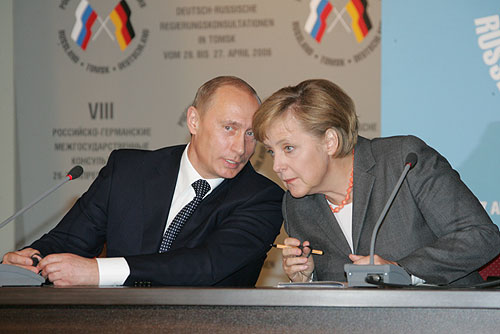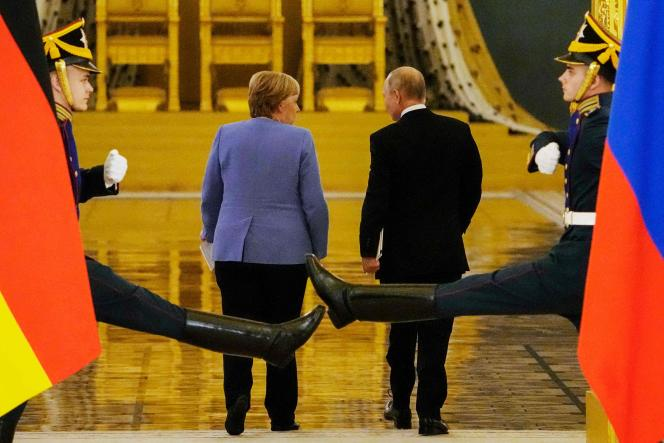Putin's Playbook: Germany
- Perri Grace
- Sep 24, 2021
- 7 min read
Updated: Dec 14, 2023
Germany’s lack of natural borders and powerful neighbours have been long-term sources of insecurity for the country. Hot on the heels of the country’s reunification in 1990 and the Soviet Union’s collapse in 1991, they alleviated these insecurities through economic and political integration in the European Union (EU), designed to build interdependence such that war was unthinkable. Beyond their immediate neighbours however, Germany’s security policy has long relied on the United States, housing approximately 40 US military bases, 35,000 US troops, and US nuclear weapons.
This arrangement has been stable for decades, but as the Indo-Pacific becomes the primary foreign policy concern for the United States, the status quo may be shifting. The shrinking role of the United States in foreign policy and security commensurately grows the space for others to move into. For the region’s most influential players, this presents an array of problems and opportunities, as well as the potential to strengthen their regional positioning. For Russia in particular, there is the possibility to forge a new path, entirely separate from Cold War politics. What future do Moscow and Berlin see in each other and wider Europe?
Play #1: Strategic Ambiguity
The two key bodies in Europe are the EU and the North Atlantic Treaty Organisation (NATO). The latter was formed explicitly against Russian interests, and so a decrease in its centrality could change the landscape of European geopolitics. Russia has ensured the feasibility of this change and a seat at the table by avoiding the Cold War era divide and staying engaged with Europe, albeit not without tensions. Germany also seems to be open to the prospect of a more European-integrated Russia, as evidenced by the glacial pace at which it responds to Russian tensions and crises, and its continued investment in Nord Stream 2, which ties its energy security closer than ever to the Kremlin. If we see a Europe with little US involvement this policy may prove fruitful for Moscow, though not without significant challenges. The EU strategy for creating collective security has been to build deeply integrated economic ties so that war between its constituent states is extraordinarily costly. Russia’s current state is not suitable for the precedents the EU has set for involvement, but in the interests of security, this could change.
"Beijing's rise is not all sunshine and rainbows for Putin"

It’s not only economics and the US refocusing that alters Russia’s geopolitical calculus. Although the rhetoric claims that Moscow and Beijing are good friends, it’s not all sunshine and rainbows for Putin. The rise of any power in your backyard and on your borders is a threat, and giving yourself strategic flexibility is critical. China is a real threat to Moscow’s power, having already started to alter the status quo in Central Asia through the Belt and Road Initiative and the Shanghai Cooperation Organisation. It has been some time since Russian hegemony over Central Asia was in contest, and it’s not a situation Moscow will look kindly on. In recent weeks, China’s state-affiliated media People’s Daily launched a Kazakh language page, and China has stationed troops on the Tajik border with Afghanistan. Putin has sought to keep his options with Europe open; securing his western flank in the case of tensions or conflict to the east would be absolutely critical.
Play #2: Creating Space
The Kremlin aims to create a gap between the strategic interests of NATO and those of the European Union, and one of its primary targets is Germany. Their position at the political and economic forefront of Europe, and their willingness thus far to increase involvement with Russia are Putin’s best chance to reorient the security landscape in Europe, and lessen the threat posed by NATO. The April 2014 suspension of NATO-Russian ties, and the sanctions on trade have not changed Berlin’s interests. Despite these it has grown critical ties like Nord Stream 2, and in recent months has called for a reset of the EU-Russia relationship.
In seeking to improve the odds of a closer relationship with Berlin, Moscow has pursued the route of media influence. The Kremlin-sponsored RT Deutsch has expanded its operations and offerings over the last decade or so, including launching a news website 6 months after the annexation of Crimea. It has grown its online audience considerably, improving Moscow’s ability to influence the public discussion on key topics in Germany.

Criticising the United States and NATO, supporting Nord Stream, and election coverage are the networks' most important topics. The latter is more critical than ever, as Merkel’s retirement means we are guaranteed to see new leadership in Berlin. RT Deutsch has sought to promote far-right politicians and engaged in electoral fraud disinformation campaigns around mail-in ballots, sowing distrust in general and strengthening candidates favourable to their interests of separating Germany from NATO.
Germany has shown enormous willingness to improve its ties with Moscow, even while holding all the pieces necessary for a hardline stance against Russia. They would have the backing of their closest security partner - the United States, have the ability to enforce powerful economic sanctions, and housed Russian opposition leader Alexei Navalny in a Berlin hospital. Despite this they have not sought to move the EU in an anti-Russia direction whatsoever. The EU is not Germany however, and for their part French President Emmanuel Macron has been far more willing to act against Russia interests, giving voices to Belarussian opposition parties and issues, and even meeting the exiled Opposition Leader Sviatlana Tshikhanouskaya. Germany is yet to meet with Tshikhanouskaya and has taken a careful approach to Belarus even as Poland and Lithuania continue to voice concern. Berlin does not appear interested in worsening its ties with Moscow, indicating that both countries see a new possible future in Europe.
Play #3: Hedging Economic Bets
While at present NATO policy and US involvement inform the various sanctions and economic divides between Russia and the rest of Europe, as the role the US plays declines this is subject to significant change. A Berlin that is seeking to create a stable security balance with Russia is likely to approach it the same way they approached the rest of the countries nearby - build economic ties and interdependence until the use of military force would be a fateful decision.

This is an area of significant mutual interest between Berlin and Moscow. While Russia is certainly not going to join the EU any time soon, that is not necessary to increase investment in the Russian economy. As a heavily modernised, industrial, and export-dependent country at the centre of the EU, the German government is already heavily involved in the economies of its neighbours, and strengthening them and the ties between their economies has been their most important foreign policy goal for decades. Extending this economic reach into Russia is an extraordinary opportunity for German economics and security. Despite the various sanctions in response to the 2014 annexation of Crimea, Germany remains heavily engaged in trade with Russia, and many of each other’s big companies have strengthened their relationships in recent years, such as Dresdner Bank’s relationships with Gazprom and Rosneft.
"Russia's stagnant economy limits their ability to pull countries into economic gravitational orbit."
On the Russian side, their stagnant economy limits their ability to pull countries into economic gravitational orbit, and so instead are reliant on their abundant natural resources to do so. This is not a strong long-term situation to be in, and severely limits the extent to which the Russia economy will improve. Additionally, the recently completed Nord Stream 2 will not only provide Russia with the opportunity to increase its EU-bound gas supplies and thereby their political leverage, but will also reduce bypass Belarus and Ukraine, which will become less important to the EU as a result.
What's Next After Merkel?
The EU has little transactional leverage over the Kremlin, and its weak military, fragmented intelligence apparatus, and disunited foreign policy means that Russia is not truly threatened by the bloc. As such it is deeply important to Moscow to encourage its primacy over NATO.
For Germany, the prospect of a more economically involved Russia should be treated with severe caution. Unlike EU members, Russia has the option of looking East for security and economic ties. It is hedging its bets, as all states do, but doing so is a far cry from true willingness to create a mutually secure Europe. Its interests are inherently less aligned with Germany than most of the EU is, and Russia is not going to compromise its sovereignty as EU member states have. In order to build a strong, workable relationship with Moscow going into the future, Berlin must find points of leverage.

Russia is looking at moving west, at recreating the old spheres of influence that challenge US security primacy in the region and thereby NATO, its greatest threat. Whether the US will pull back to the extent predicted is unknown, as is the question of whether Russia will be able to overcome its internal issues and truly build economic participation with Europe. Russia has built numerous advantages for itself however. Putin has kept his options open through strategic ambiguity, hedging his bets in case Russia security is threatened on its other flank. By growing the influence of RT Deutsch and its counterparts around Europe, it has increased its ability to impact the internal politics of Germany.
"Germany will have to tackle the challenge of uniting the foreign policy of a wildly disparate continent, while also adjusting to governance without Merkel for the first time in 16 years."
The EU as a bloc remains undecided on its approach to their eastern neighbour. Any consensus will be difficult to forge when trying to balance the interests of both immediate neighbours to Russia and countries thousands of kilometres away. New leadership in Germany is enormously consequential for Europe, as Germany will have to tackle the challenge of uniting the foreign policy of a wildly disparate continent, while also adjusting to governance without Merkel for the first time in 16 years. With the EU so focused on recovery and preserving unity in the face of COVID-19’s economic downturn, Berlin will avoid anything that might alienate those with different foreign policy ideas, like France or Poland.
The origins of Russia’s modern day Tsar can be traced directly to East Germany, where a young Vladimir Putin was given his first assignments. He is intimately familiar with German history and politics, and knows all too well which levers and buttons are effective against the German Republic. With Germany now in an ascendant position in Europe and at the pinnacle of the EU, Russia can skew the direction of the entire continent by altering the course of Germany. As the steady hand of Angela Merkel is taken off the steering wheel of Europe, Russia is looking to fill the power vacuum forming. Russia was responsible for dividing Germany once, but can they do it again?
Written by Perri Grace
Edited by Owen Swift
The thumbnail created for this page contains images created using AI.
.jpg)



